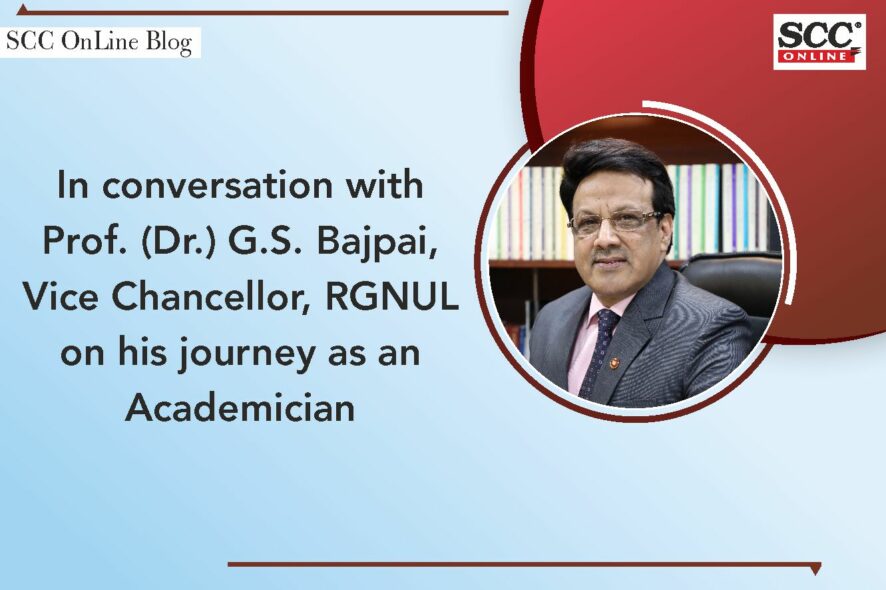Prof (Dr) G.S. Bajpai serves as the Vice Chancellor of RGNUL, Punjab. Equipped with more than thirty years of professional experience as an author, researcher, teacher and administrator, he has recently been appointed as Convenor, Committee for Reforms in Criminal Laws set up by the Ministry of Home Affairs, Government of India, which is tasked with spearheading historic reforms in criminal laws in India. He has previously served as the Registrar, National Law University, Delhi.
He has been interviewed by EBC-SCC Online Student Ambassador Dikshi Arora who is currently pursuing law from Rajiv Gandhi National University of Law, Punjab.
- Can you tell us something about your law school journey and take us through the early days of your profession?
My formal education is from Madhya Pradesh. I graduated from Dr Harisingh Gour University, Sagar, Madhya Pradesh. I have served in several capacities for over three decades – the Indian Institute of Public Administration, Bureau of Police Research and Development, Dr Harisingh Gour University, Sagar, National Law Institute University (NLIU), Bhopal and National Law University, Delhi. I pursued postdoctorate in criminal justice from Leicester University, UK as a Commonwealth Fellow at the Department of Criminology, Leicester University, UK.
- As you are well known across the legal fraternity as an expert in criminal law, what influences you to choose a profession in academia, over options such as judicial services or law firm?
Research has been my passion and I started publishing from a very early stage of my career. I got selected through UPSC to the Bureau of Police Research and Development, where I worked for about three years before moving to teaching and research profession but I was inclined to teaching and research.
- As the pandemic has also hit the educational institutions, how has RGNUL, Patiala adapted to the administrative and professional changes brought about by the pandemic?
RGNUL geared to create an effective platform for online teaching during the pandemic. To this effect, experts trained our faculty for dissemination of knowledge on virtual platforms. Besides, RGNUL pioneered in conducting online examinations on real-time basis. We have also intensified a variety of other online activities including webinars, expert lectures and group activities.
- Furthermore, what practice or approach can universities adopt all over India to make the system of online education better and more effective?
The portals of learning in India were ill-prepared for online learning system. For efficacy in online education, the intensive orientation of faculty for application of various software and tools and participation of students for interactive learning environment becomes imperative. This transitional phase of learning and teaching necessitates development of competencies.
- As RGNUL has started accepting applications for the LLM (Executive) programme from this year onwards, how is this course different from LLM one-year postgraduation course that the university already offers?
The recently introduced LLM (Executive) programme proffers diverse specialisations for professionals working in different fields. Graduate of any discipline or profession who wants legal knowledge to enhance can join the course. This is a flexible programme specially designed to suit the requirements unlike regular LLM (one-year postgraduation course).
- You have earned a doctorate as well as a postdoctorate from Leicester University, UK. When is the right time or factors to take into consideration before pursuing postgraduation (LLM)?
The higher studies in overseas countries offer various options. Students willing to pursue studies abroad must acquaint themselves with the requisites of such courses well in advance, before applying to foreign institutions.
- What would be your advice to the students who want to make the same career trajectory as you did i.e. academia?
Law academia is a very fascinating option as there are good numbers of national law universities in the country which require dynamic faculty. Law students desiring to be in academics should start studying the basics of law from an early stage and also expand their interest by reading emerging literature in various fields of law. The publications and research papers are always very helpful in the career building in academia.
- Being an expert in criminology and criminal law, which books or scholarly articles/papers do you suggest to students?
The literature is quite rich in every field of law. In criminology and criminal law, students can be benefitted greatly by studying Prof Andrew John Ashworth, Dr Alan Norrie, Robert Peterson, Mancus Drubler and Nicola Lacey.






